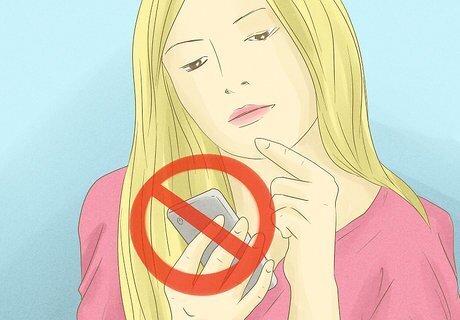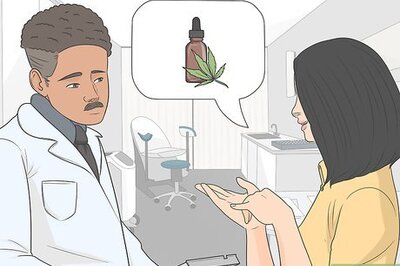
views
X
Research source
[2]
X
Research source
Changing Your Mindset

Evaluate your needs, wants and goals. You may be preoccupied because you see your obsession as part of who you are. Instead, you need to focus on yourself. Mentally separate yourself from your obsession by considering what other areas of your life contribute to who you are. Think about tasks, roles, or jobs that reward you as much as your obsession. Is your obsession based on a fantasy or idealized version of a person or activity? You need to start seeing how the obsession has served or fulfilled you before you can begin to fulfill that need in other ways. For example, if you're currently in a romantic relationship but obsess over a co-worker who flirts with you, you might need to refocus your attention on making your relationship fun again.

Practice mindfulness. Become aware of yourself and your surroundings without judgement. To do this, tune in to each one of your senses while you also pay attention to your physical or emotional state. For example, notice if your body is tense, you feel fatigued, or you're content with your life. Even being mindful for small periods of time can help you become more aware of yourself. Mindfulness can help you to become more connected with yourself and others because it builds empathy and emotional intelligence. It can even stop you from negatively dwelling on things you can't control. Instead, you'll be able to regulate your fear or anxiety when you're stressed.

Refocus your attention. Think about something else to take your mind off of your obsessive thoughts. Don’t be hard on yourself if you find your mind wandering back to your obsession, simply acknowledge the thought and let is pass you by as you practice focusing on something else. To distract yourself, try reading a great book, chatting with a friend, or taking up a new volunteer position. You could also do something physical like taking a yoga class or cooking a complex meal.

Write a letter to your obsession. If you find that you're emotionally drained from constantly obsessing, you need to get in touch with your emotional needs. A good way to practice this is to write a letter to your obsession telling the obsession why it attracted you. Explain what part it's played in your life and the emotions your obsession makes you feel. Also, tell your obsession why it is has become worrisome or why it is causing you stress. Getting in touch with your emotional needs will help you to start meeting them, relying less on your obsession.

Put the obsessive thoughts on hold. You may be constantly obsessing. To stop these obsessive thoughts from interfering with your life, tell yourself that you'll only obsess at certain times of the day. Put it off for the moment and tell yourself you can obsess later. You might find that your mind relaxes enough to forget to obsess. For example, if you start to obsess over something when you're out with your friends, remind yourself to enjoy the moment and tell yourself you can always obsess when you get home.
Creating New Opportunities

Find a solution to your obsession. If you're obsessing over a challenge or problem, try to solve it. Brainstorm a list of options, so you feel like you have options. If you have trouble seeing potential solutions, talk with other people who have experienced a similar situation to the one you're trying to solve. Other people may be able to offer you a different perspective to solving your problem. For example, maybe you've been obsessing over a way to maintain your fitness through a life change. Your challenge could be finding a way to schedule your morning run while still being able to take your new infant to daycare. You might talk to another new parent or offer to take turns with childcare so you can work out.

Create a support network. You may feel that obsessing over something or someone has isolated you from friends and family. Re-connect to friends, family, or co-workers who you can explain your situation to. Talking can help you understand the underlying cause of your obsession and having a support network to turn to can reduce your stress. For example, if you're obsessing over an ex after a break up, talk with a friend or family member. Talking with your friend might help you realize that you're obsessed because your ex was the first person to take you seriously in a relationship.

Try new experiences. It's easy to slip into the routine of obsessing over something if you're not challenging yourself with new things. If you've been meaning to pursue a new hobby or take a class, start doing it. Not only will you take your mind off of your obsession by focusing on a new task or skill, you may also meet new people or learn something new about yourself. New people and new ways of thinking can help you move beyond your obsession. You might realize that you no longer crave whatever the obsession rewarded you with. For example, you might not obsess over a lost job opportunity if you learn a new trade that you actually enjoy more.

Do something positive for others. You might be so focused on obsessing over something going on in your life, that you completely overlook the lives of your friends, family members, or people in your community. Reach out to people who might need your help. Not only will they appreciate it, but you'll realize there's more to life than your obsession. For example, you might tutor at a school, serve at a soup kitchen, or drive an elderly relative to the grocery store.
Changing Your Habits

Limit your exposure to your obsession. If you're obsessed with something like playing video games or watching TV, begin to reduce the amount of time you spend doing it. If you're obsessed with a person, limit how often you contact the person. Cutting back on your obsession can help you become more independent and carefree. For example, if you're limiting contact with a person, remember to include social media time when cutting back on contact. Avoid texting, messaging, sending photos, or calling often.

Keep yourself busy. When you're busy, it's easy to forget about what's bothering you. Preoccupy your mind so that you don't obsess. In addition to trying new things, you can also catch up on tasks you've been meaning to do, staying in touch with your support network, and taking time to focus on your needs. You might find that much of your time had previously been spent obsessing. Think about things you've put on hold and finally do them. For example, you could get a haircut or meet up for a drink with friends who you've been putting off for a while.

Take responsibility. It's easy to make your obsession someone else's problem. But, instead of worrying over something that you believe to be someone else's fault, just own up to it. Taking responsibility will help you control your mindset. Only you have control over your thoughts and you can stop obsessing. For example, if a colleague got a promotion you were up for, don't blame the colleague and obsess over it. Instead, take responsibility for the fact that your colleague was more qualified than you.

Spend time with a different social group. If you obsess over something, regardless of whether it's a drug, video games, or a person, chances are your friends enable you to obsess. To stop obsessing, you should be in an environment where you don't feel like obsessing and the people around you don't bring it up. You might want to spend your free time in a different hang out spot and be around people that don't enable you, even if this means taking a break from certain friends. Are all of your friends part of this culture? Then you may have to rely on family. Take this as an opportunity to renew your relationships with those you've fallen away from recently. You could rediscover people that you've been missing in your life.

Relax and have fun. Obsessing over something or someone is stressful. Take a break from the anxiety and do something you find relaxing. You might soak in a bubble bath, practice deep breathing, or have a glass of wine while you read a book. The point is to do something you enjoy that also calms you. If you're having trouble with obsessive thoughts while you relax, consider playing a recording of guided imagery or listen to an anxiety relief script.

















Comments
0 comment